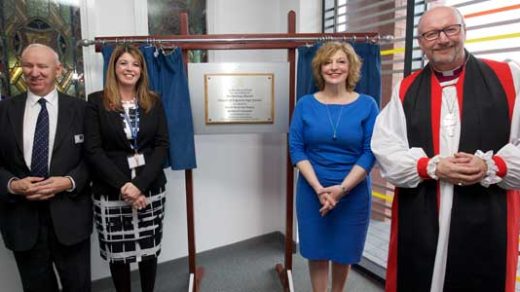Careers explored: Space

The space industry isn’t just for astronauts – it’s full of exciting careers for anyone who loves science, technology, and the mysteries of the universe.
Currently, the UK is leading the way with incredible projects that design spacecraft, build satellites and explore the mysteries of the space environment.
In this feature, Educate takes a look at three very different careers, each offering exciting opportunities and different pathways to get there.
Aerospace engineer
Aerospace engineers design, develop, and test vehicles that operate in the air and space.
They work on everything from aeroplanes and satellites to rockets and space stations, from designing spacecraft components, such as propulsion systems, wings, and thermal shields, to testing materials and systems to ensure they can survive the harsh conditions of space.
The role of an aerospace engineer is vital in making space exploration and advanced technology possible. Without them, we wouldn’t have the rockets that carry astronauts into space, the satellites that connect our world, or the cutting-edge spacecrafts that explore other planets. It’s a career that requires a passion for problem-solving, creativity, and attention to detail.
For graduate or entry-level roles, you can expect to achieve an annual salary of around £25,000, depending on the location.
To become an aerospace engineer, you’ll need a strong foundation in maths and physics. Most start with a degree in aerospace engineering or mechanical engineering.
The University of Central Lancashire (UCLAN) offer a three-year BEng (Hons) aerospace engineering degree. The course sees students apply everything they have learned to the analysis and design of flying vehicles.
Dr Kirijen Vengadasalam, senior lecturer in aerospace engineering at UCLAN, said: “At the University of Central Lancashire, we offer an outstanding pathway for aspiring aerospace engineers that’s ranked second in the UK for Learning Opportunities (NSS, 2024). We blend cutting-edge innovation with industry-focused learning, giving our students the knowledge and skills to tackle real-world challenges in a thriving global industry.
“Students will get access to state-ofthe-art facilities, including advanced engineering laboratories and simulation suites. Our courses involve hands-on, project-based learning, ensuring that our students leave university with the practical experience that the industry expects. Our strong industry connections provide opportunities for students to gain a placement with leading aerospace companies like Airbus and Rolls-Royce. What’s more, we offer foundation entry programmes for those who don’t meet the entry requirements or who are returning to study after a break.”
He adds: “For those with ambitions to combine engineering with aviation, our MEng/BEng aerospace engineering with pilot studies courses provide a unique dual focus, offering the chance to work towards a pilot’s license alongside rigorous engineering training.
“We’re officially the most affordable university in the UK (The Times UK League Table, 2023), and we focus on employability, innovative teaching, and a dedication to shaping the future of aerospace engineering. We’re ideal for students ready to launch their careers in this exciting and dynamic field.”
Alternatively, if university isn’t the pathway for you, there are a range of apprenticeships available. Morson Projects offer apprenticeships through its early careers development programme.
The programme provides apprentices with a first-class, hands-on learning experience that bridges the gap between education and practical industry application. Its engineering apprenticeship programme is created for engineers by engineers.
Gareth Beck, divisional director for maritime, aerospace and defence, at Morson Projects, said: “What we tend to do with our early careers development programme colleagues is expose them to as many different aspects of the sector as possible to see what most inspires and excites them.
“That might be software, design, or analysis, for example, or perhaps they might enjoy having a broader understanding of a project and gravitate towards project management. The key for us is to enable engineers at the beginning of their career to work on live projects with more experienced colleagues so that they can develop skills and knowledge in an area that they enjoy most.”
Speaking about the types of careers in the aerospace sector, Gareth adds: “There are a huge variety of roles in the sector at the moment, driven by the defence industry. Opportunities include everything from structural analysis and software development to writing technical manuals.
“There is also a real drive to make aviation more sustainable, which means that there are lots of roles focused on developing new technology for greener fuels too.”
Morson Projects’ early careers development programme is also open to university graduates.
The role of an aerospace engineer is vital in making space exploration and advanced technology possible.
Earth observation scientists
Earth observation scientists play a crucial role in studying and understanding our planet by using data gathered from space.
Scientists work primarily with data collected from satellites orbiting the Earth. These satellites are equipped with specialised sensors and instruments that can capture images, detect temperature changes, measure atmospheric conditions, and even track pollution levels.
Dr Andy Smith, a solar physicist at Northumbria University, explains why the study of space weather is of such great importance.
He reveals: “Like normal weather, space weather is mostly gentle and something we and society as a whole are used to. However, on rare occasions it can become extremely ‘stormy’, when this happens it can have impacts on day-to-day life. For example, it can give air passengers a large dose of radiation, disrupt radio communications, potentially damage satellites and cause problems with the power grids.
“It’s the kind of thing we need to be able to predict so people can prepare and take action, things like rerouting flights away from the poles and putting satellites in ‘safe’ mode. The problem is that it is a really complex system: to accurately predict these impacts we need to understand it better!”
To become an earth observation scientist, you’ll need a strong foundation in science and technology, and naturally a keen interest in data analysis. Most scientists will have degrees in fields such as physics, environmental science or geography.
Dr Smith continued: “Space weather is a growing community at the moment. In the past, we’ve been much less exposed to the threat, but now with more satellites going up and more reliance on communications (and electrical power!), it’s more important than ever before. Most people involved in the field have a background in physics, but increasingly we’re working with people with backgrounds in weather forecasting and computer science.
“We can learn lessons from normal weather forecasting and we need computing expertise to effectively utilise cutting-edge models.”
At Northumbria University, you can study BSc (Hons) Physics with astrophysics. The university is the world leader in the field of solar and space physics, and recently announced the new North East Space Skills and Technology (NESST) centre – an innovative space research centre set to transform the UK space industry.
Starting salaries for graduate roles in this particular sector are around £25,000 per year, depending on the location.
Space tourism
Space tourism is an exciting new industry that aims to make space travel accessible to the public. This emerging field is not just about rockets and engineering – it is also about creating unforgettable, once-in-a-lifetime experiences for paying customers who dream of seeing the Earth from space.
Companies like Virgin Galactic and Blue Origin are already taking passengers to the edge of space, and as this industry grows, the focus will increasingly turn to customer experience.
From planning and organising luxury space travel itineraries to ensuring passenger comfort and safety, professionals in customer service and hospitality will play a critical role in making space tourism successful.
Whilst space tourism is still in its early stages, it is growing rapidly, and those with skills in customer service, event planning, and travel management will be at the forefront of this exciting new industry.
Many sixth forms and colleges, including All Saints Sixth Form College, Garston, and North Liverpool Academy, Everton, offer BTEC travel and tourism courses which can provide an excellent foundation for careers in this sector.
To become an earth observation scientist, you’ll need a strong foundation in science and technology, and naturally a keen interest in data analysis.
This emerging field is not just about rockets and engineering – it is also about creating unforgettable, once-in-a-lifetime experiences.
Traditional roles such as travel agents, air cabin crew, and airport ground staff are evolving alongside the space tourism industry, creating new opportunities for those trained in these fields.
The skills developed in these courses, such as customer service, organisation, and problem-solving, are highly transferable and could pave the way for roles in this emerging sector. For instance, space agents will play a key role in coordinating bespoke itineraries, which might include luxury accommodations, pre-flight training, and exclusive post-flight celebrations.
Similarly, future space cabin crew will not only need to ensure passenger comfort and safety, while spaceport ground staff will assist with pre-launch preparations, guiding customers through check-ins, safety briefings, and state-of-the-art launch facilities.
Salaries in this field will range anywhere from £24,000 per year, depending on the location.
So, whether you’re passionate about engineering, space weather, or customer service, the space industry offers a chance to be part of something extraordinary. For those ready to dream big and work hard, the sky is no longer the limit – it is just the beginning!







